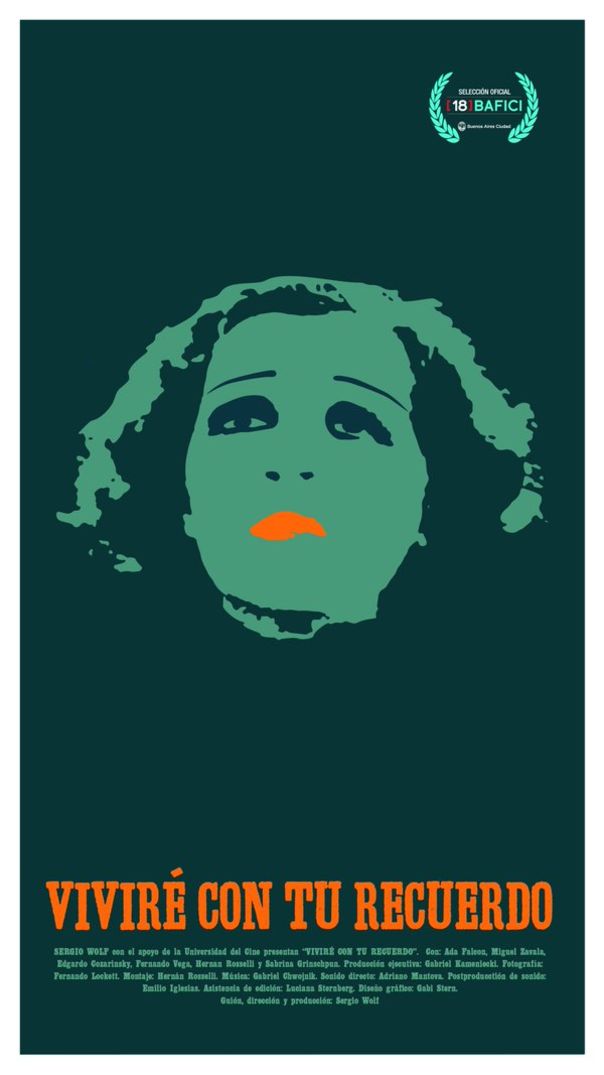Review of Viviré con tu recuerdo, directed by Sergio Wolf (International Competition)
by Rodrigo Torrijos

Viviré en tu recuerdo
“I will remember, from your passion, the vastness.
I will remember the faithful image that adored me.
I will evoke, from the look in your eyes, your softness.
And I will dream about a past that never went away.”
(Lyrics of Viviré con tu recuerdo)
Sergio Wolf directs, produces and co-edits Viviré con tu recuerdo, documentary film premiered at the 18th edition of BAFICI, festival where he participated first as programmer and then as artistic director.
The presence of Viviré con tu recuerdo in the International Competition triggered bland controversies, which included hasty accusations –140 characters deep – declaring the premiere of Wolf’s third film in the festival he used to be part of, to be an “authentic lack of elegance”.
But affinity and closeness are two different things. Sergio Wolf’s affinity with BAFICI is connected with the festival’s commitment to a determined type of films, something that Wolf helped to position and consolidate. Institutional closeness, on the other hand, is inevitable, but having seen the film we can assert that it stands on its own. It speaks with its own voice, though it probably speaks too much.
Viviré con tu recuerdo is presented as the B side of the documentary premiered in 2002 Yo no sé qué me han hecho tus ojos, where its directors (Wolf and Lorena Muñoz) become detectives in charge of figuring out the Ada Falcón enigma, revealing the reason why Ada abandoned her music career and secluded herself in a religious community to devote herself to pray.
In Viviré con tu recuerdo the query is motivated more by chance and caprice than by an urgency, doting the film of a whimsical tone that is in line with certain authorial pretensions that have great affinity with BAFICI’s spirit.
The reappearance of visual material from the original interview with Ada Falcón that could not be used in the final cut of Yo no sé qué me han hecho tus ojos propels a paradoxical race, where speech becomes a device the director/protagonist exhausts in the search of that lost dialogue, that audio trail that gives meaning to the images.
The images would go to a museum house dedicated to Falcón that Wolf interprets was inspired by his previous documentary. Wolf offers the person in charge of the museum the possibility of locating the lost interview, but even at his refusal the director undertakes the chase for the absent dialogue.
Wolf brings this up in every possible opportunity. He verbalizes it, points it out to every person connected with his unsuccessful search, in that journey of fruitless efforts that reminds us of the basic principles of screenplay gurus, produced under certain outlines such as “he tries it over and over again”.
He also puts it into poetry by projecting his voice off screen, intellectualizes it when he compares it to other texts and takes it up again as an editor when other mention his mission. As if he needed to justify the existence of a work that is “slightly apocryphal and inevitably self-referential”.
Silence and rest start taking over the film, pulling it out of its voluble logic and giving priority to moments of visual exploration where the development of the process – from its handcrafted stage – take the screen. These moments coincide with more elaborate shots, which give new life to an uneven and rapidly exhausted discourse.
The configuration of the film image through the static effigies in the Moviola turns out to be the central sight of Viviré con tu recuerdo. The technical battles of what the film cannot become, of life and of the effort that remain off screen appear tangible.
Those moments of silence where photos alternate and become the lips that move to reveal the secret are like listening to oneself breathe. They remind us that most films are made of whim, tenacity, of narcissistic searches, but that even so, the silent truths emerge, beyond the controversies or noisy reviews, to remind us that what we are or have been are affectations of the illusions of the ego and of memory.
Mariángela Martínez Restrepo - Talent Press BsAs Coordinator
Clara Picasso -Text translator

